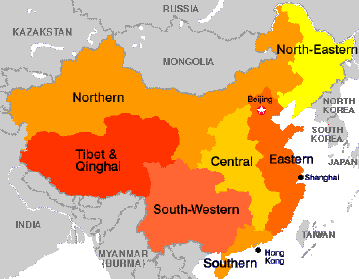Behavior
& Manners in China
 Do
not use large hand movements. The Chinese do not
speak with their hands. Your movements may be distracting
to your host. Do
not use large hand movements. The Chinese do not
speak with their hands. Your movements may be distracting
to your host.
 Personal
contact must be avoided at all cost. It is highly
inappropriate for a man to touch a woman in public. Personal
contact must be avoided at all cost. It is highly
inappropriate for a man to touch a woman in public.
 Do
not point when speaking. Do
not point when speaking.
 To
point do not use your index finger, use an open
palm. To
point do not use your index finger, use an open
palm.
 It
is considered improper to put your hand in your
mouth. It
is considered improper to put your hand in your
mouth.
 Avoid
acts that involve the mouth. Avoid
acts that involve the mouth.
 Gift
giving is a very delicate issue in China - See international
business gift giving. Gift
giving is a very delicate issue in China - See international
business gift giving.
 It
is illegal to give gifts to government official
however; it has become more commonplace in the
business world. It
is illegal to give gifts to government official
however; it has become more commonplace in the
business world.
 It
is more acceptable to give gifts either in private
or to a group as a whole to avoid embarrassment. It
is more acceptable to give gifts either in private
or to a group as a whole to avoid embarrassment.
 The
most acceptable gift is a banquet. The
most acceptable gift is a banquet.
 Quality
writing pens as considered favored gifts. Quality
writing pens as considered favored gifts.
 The
following gifts and/or colors are associated with
death and should not be given: The
following gifts and/or colors are associated with
death and should not be given:
 Always
arrive on time or early if you are the guest. Always
arrive on time or early if you are the guest.
 Do
not discuss business at meals. Do
not discuss business at meals.
 Do
not start to eat or drink prior to the host. Do
not start to eat or drink prior to the host.
 As
a cultural courtesy, you should taste all the dishes
you are offered. As
a cultural courtesy, you should taste all the dishes
you are offered.
 Sample
meals only, there may be several courses. Sample
meals only, there may be several courses.
 Never
place your chopsticks straight up in your bowl.
By placing your sticks upright in your bowl your
will remind your host of joss sticks which connotes
death. Never
place your chopsticks straight up in your bowl.
By placing your sticks upright in your bowl your
will remind your host of joss sticks which connotes
death.
 Do
not drop the chopsticks it is considered bad luck. Do
not drop the chopsticks it is considered bad luck.
 Do
not eat all of your meal. If you eat all of your
meal, the Chinese will assume you did not receive
enough food and are still hungry. Do
not eat all of your meal. If you eat all of your
meal, the Chinese will assume you did not receive
enough food and are still hungry.
 Women
do not usually drink at meals. Women
do not usually drink at meals.
 Tipping
is considered insulting, however the practice is
becoming more common. Tipping
is considered insulting, however the practice is
becoming more common.
 More
information on International Gift Giving More
information on International Gift Giving
 Considering
sending a gift to someone in Chile? See gifts to China Considering
sending a gift to someone in Chile? See gifts to China
|



